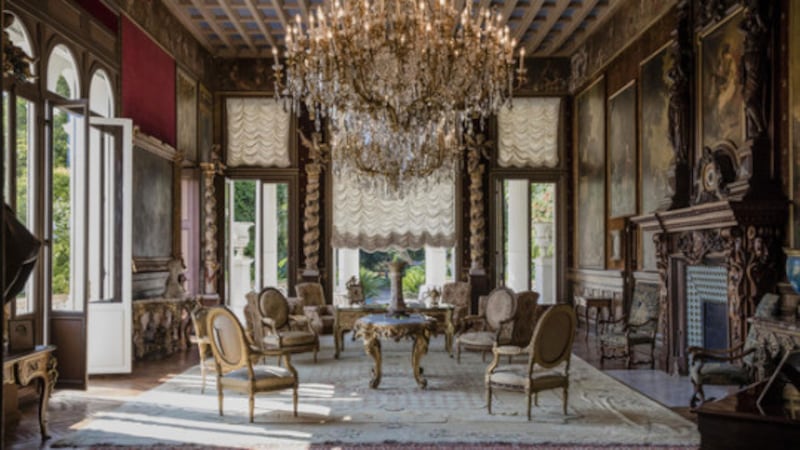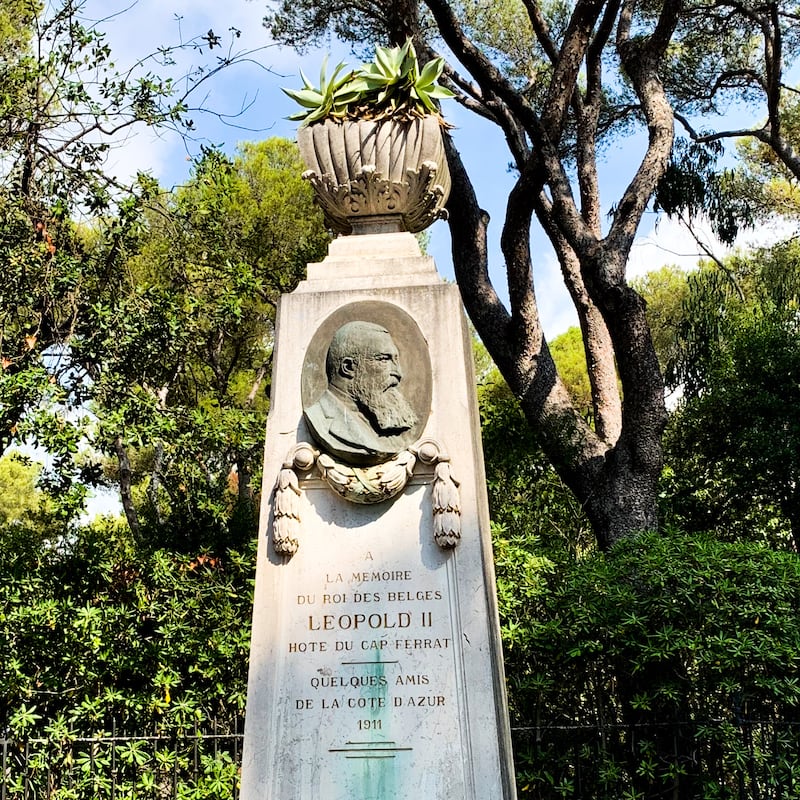KYIV, Ukraine—For most of this century, Ukrainian oligarch Rinat Akhmetov, 53, has been building a huge fortune while trying to divest himself of a dangerous reputation. He presents himself now as a philanthropist and a would-be peacemaker in this country diseased with corruption and wounded by war. And he might be both.
But his personal history during the wild days after the collapse of the Soviet Union in the 1990s is full of holes, and stories of mob connections have often filled in the blanks.
So, when news broke recently that Akhmetov had bought the most expensive—and infamous—mansion on the French Riviera, the move raised a lot of new questions about Akhmetov’s public relations judgment, his current business practices and, inevitably, his past.
Villa les Cèdres, as it’s called, was bought and built up in 1904 by Belgium’s King Leopold II, who had amassed an enormous fortune through the brutal colonization of what he called, incongruously, the Congo Free State. There Africans worked under horrific conditions on rubber plantations and in the mines and, between harsh treatment and disease, hundreds of thousands died. It was “slaughter on a staggering scale,” as one historian wrote , “the collateral damage of a perfidious, rapacious policy of exploitation.” As Leopold’s British biographer put it, “He was greedy for money and chose not to interest himself when things got out of control.”

The villa, perched on a rise overlooking the clear azure waters of the Mediterranean and the umbrella pines of the ultra-chic Saint-Jean-Cap-Ferrat peninsula, with its 14 bedrooms, opulent public rooms, and immaculately manicured gardens, could not feel more far removed from the hellish conditions that existed in the Congo.
It’s also very far removed from Mariupol, an industrial port in eastern Ukraine, which is home to two giant factories owned by Akhmetov and is the most polluted city in the country. The vast majority of emissions are produced by Akhmetov’s “Metinvest” steelworks, and the contamination is such that the country’s environmental activists call the oligarch’s company “Akhmet-Death-Invest.”
The Metinvest press service did not respond to requests for comment on pollution levels.
There is a common belief in Donbas that Akhmetov controls just about everything in Mariupol—state institutions, law enforcement agencies, and city management—but rarely visits the city and almost never thinks about its public health issues.
On the day Ukraine heard about the purchase of Villa les Cèdres last month, the founder of the 0629 news website, Anna Myrlykina, checked the level of the metal dust in the air recently: “Right now the levels of pollution are twice as high as the norm... It’s a nightmare,” Myrlykina told The Daily Beast.
“By buying himself that 14-bedroom villa instead of spending $250 million on our environment, Akhmetov spat into half a million faces in Mariupol—at all of Ukraine,” said local politician Galina Odnorog.
“Oligarchs are running our country, promoting their own ministers, lobbying for laws that suit them,” Odnorog said. “Nothing is changing. Powerful oligarchs divide our country into spheres of influence, while our people die like flies from pollution, from poverty, and our civil society is too weak to break this deadly circle.”
Kyiv-based corruption fighter Daria Kaleniuk notes a recent report by the International Monetary Fund that shows “Ukraine has, by far, the highest baseline mortality rate from pollution-related illness,” of any of the 30 countries listed in its survey: 16 deaths per thousand as compared with 10 in Russia, 5.3 in China, and 4.9 in the United States.
“What a cynical gesture that villa is from somebody whose factories cause lethal diseases,” said Kaleniuk.
Anastasia Bogdanovich is one of the most vocal critics of Akhmetov. “Mariupol’s children go to School No. 20, just a few meters away from Akhmetov’s factory pipes."
So, is Akhmetov, like the previous owner of Villa les Cèdres, just greedy for money and choosing not to interest himself in things that have gotten out of control?
In fact, the situation is more complicated than that. He is the product of a deeply corrupt system, but has also offered a lifeline to victims of Ukraine’s separatist war.
Rinat Akhmetov, whose father and older brother labored in the mines of the Soviet Union, was born in the eastern Ukraine city of Donetsk in 1966 and is now the richest man in the country, but an exile from his hometown.
He is not an easy man to read. He is part of the Tatar minority and a practicing Muslim in a nation that is overwhelmingly Orthodox Christian. He favors colorful jackets, $1.5 million watches, and gold-colored aircraft. His hair is sandy-colored and impeccably coiffed. But he has the face of a poker player. His eyes rarely reveal emotion. He seems to know how to stay calm, almost invisible, in critical situations.
Despite myriad allegations and a great deal of sensational press in years past, his personal history is largely blank until October 1995 when Alik Grek, his business partner and the president of the popular Shakhtar Donetsk professional soccer club, was blown up by an assassin’s bomb in the Donetsk stadium.
In Ukraine and other post-Soviet states, the ruthless scramble for what had been state-owned resources often turned bloody and there were always lots of suspects; but proof against any of them was and remains hard to come by. No known evidence has ever tied Akhmetov to the Grek bombing. He has never been convicted of any crime. But he was well positioned to assume control of his partner’s assets, including the soccer club, and so he did.
Akhmetov’s press secretary, Anna Terekhova, insists that stories about his connections with Donetsk mobsters “are all a lie that bears no relation to reality.” Terekhova also pointed out to The Daily Beast: “Every time international press republished the false allegations, we have always sought and received rebuttals and apologies.”
About 20 years ago, Akhmetov founded System Capital Management, SCM, a holding company which today is the biggest employer and investor in Ukraine. By April 2008 Akhmetov, who had great connections in Kyiv, was worth $7.3 billion according to Forbes magazine, and his fortune just continued to grow.
In February 2006, U.S. Ambassador John Herbst had sent a cable from Kyiv to Washington about U.S. lobbyists helping then-ex-President Viktor Yanukovych improve the reputation of his Party of Regions. And who should appear on the scene but Donald Trump’s future presidential campaign chairman, Paul Manafort, aiming, as he cable said, to change the party's image “from that of a haven for mobsters into that of a legitimate political party.”

“Tapping the deep pockets of Donetsk clan godfather Rinat Akhmetov,” Herbst wrote in passing, “Regions has hired veteran K Street political help for its ‘extreme makeover’ effort. According to the internet news site Glavred.info, Davis, Manafort & Freedman is among the political consultants that have been hired to do the nipping and tucking.”
Yanukovych eventually regained the presidency with help from Akhmetov and Manafort, but was forced out by a popular uprising in 2014, which then was followed quickly by the Russian annexation of the Crimean peninsula and a rebellion by Russian-backed separatists in eastern Ukraine that continues to this day and has cost more than 14,000 lives.
By 2014, Yanukovych and Akhmetov had parted ways. When Yanukovych decided to assert his authority over big business and delegate more power to his son in 2012, Akhmetov did not like it. He was one of Ukraine’s oldest, best-established oligarchs, “and he did not welcome the changes,” well-known television host Yevgeniy Kisilev told The Daily Beast.
It was at Yanukovych’s birthday party, Kisilev said. The president addressed young people including his son, promising them more authority. “He asked the guests if anybody disagreed and, amid complete silence, heard one voice: ‘I disagree. Young ones have to learn to be patient first.’ That was Akhmetov’s voice.”
In May 2014, as the war began, Akhmetov left Donetsk for what was supposed to be just three days, but while he was away pro-Russian militia took control of the city. “It’s like a non-healing wound for Mr. Akhmetov not to be able to go back to his town and home region,” Terekhova told The Daily Beast.
His philanthropy since then has been appreciated by those organizations trying to get aid to the people of the Donbas region. His Humanitarian Center has supplied 12 million food packages to Ukrainians affected by the conflict.
Enrique Menendez, the founder of Responsible Citizens of Donbas aid group, told The Daily Beast that despite Akhmetov’s heavy schedule managing his empire, “Every time we met he was caring, polite.”
In the midst of the war, separatist authorities forced Menendez and his team out of Donetsk on accusations that they were working as Kyiv’s agents of influence. Today Menendez says he is grateful for Akhmetov stepping in to rent apartments for six of his team members for a year and provide support for the group’s startup on Kyiv-controlled territory. “I remember one phrase Mr. Akhmetov told me: ‘А patient one defeats a strong one,’” Menendez said.
The first president of post-Soviet Ukraine, Leonid Kravchuk, believes that Akhmetov is helping more poor and sick Ukrainians than any other oligarch. “Akhmetov ships up to 14 tons of food to Donbas in humanitarian aid, his funds provide support for blind and deaf children,” Kravchuk told The Daily Beast. “I personally often speak with him, his position is clear: he wants Donbas to be Ukrainian, he wants Ukraine to be democratic.”
The current president of Ukraine, Volodymyr Zelensky, used to be a television comedian, and in 2018 Akhmetov was the butt of one of his jokes. “When was Akhmetov last seen working hard at a factory with his back hunched over? When he was carrying Metinvest’s profit out, in cash.”
Friends of Akhmetov say that these days he lives most of the time in a luxury apartment in London—his two sons are British citizens. Will he now live in Villa les Cèdres part of the year as well?
“Considering the current condition of the villa and the adjacent property, we will have to invest heavily to unleash the potential,” Akhmetov’s spokeswoman Terkhova told The Daily Beast. “It is too early to talk about the use of the villa by anyone.”



